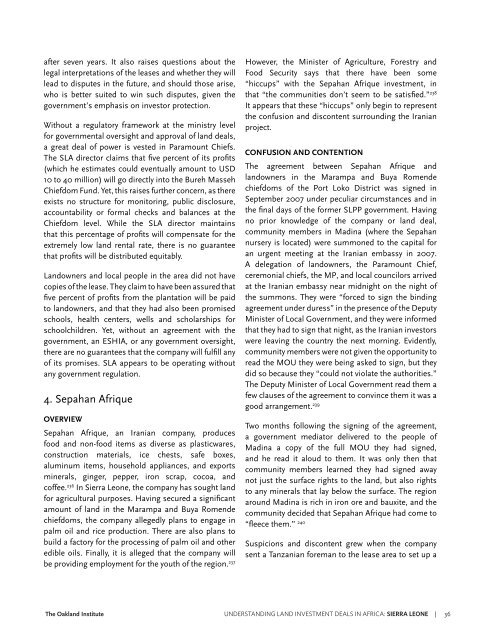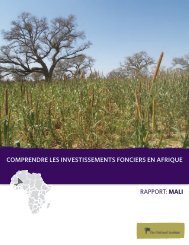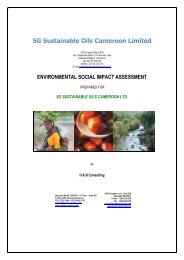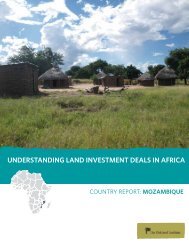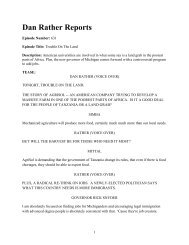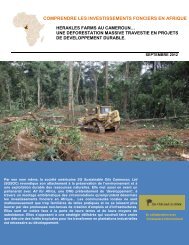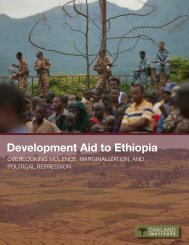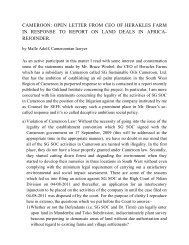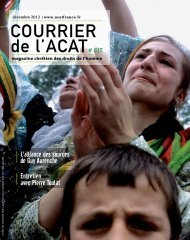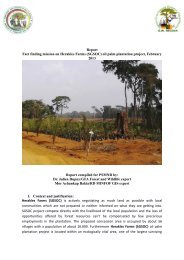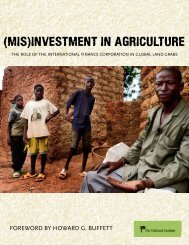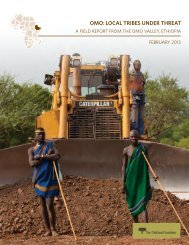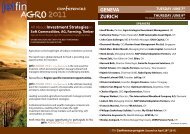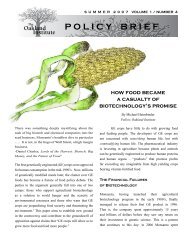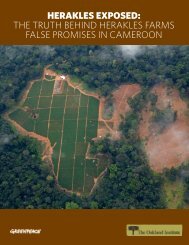Country Report: Sierra Leone - Oakland Institute
Country Report: Sierra Leone - Oakland Institute
Country Report: Sierra Leone - Oakland Institute
You also want an ePaper? Increase the reach of your titles
YUMPU automatically turns print PDFs into web optimized ePapers that Google loves.
after seven years. It also raises questions about the<br />
legal interpretations of the leases and whether they will<br />
lead to disputes in the future, and should those arise,<br />
who is better suited to win such disputes, given the<br />
government’s emphasis on investor protection.<br />
Without a regulatory framework at the ministry level<br />
for governmental oversight and approval of land deals,<br />
a great deal of power is vested in Paramount Chiefs.<br />
The SLA director claims that five percent of its profits<br />
(which he estimates could eventually amount to USD<br />
10 to 40 million) will go directly into the Bureh Masseh<br />
Chiefdom Fund. Yet, this raises further concern, as there<br />
exists no structure for monitoring, public disclosure,<br />
accountability or formal checks and balances at the<br />
Chiefdom level. While the SLA director maintains<br />
that this percentage of profits will compensate for the<br />
extremely low land rental rate, there is no guarantee<br />
that profits will be distributed equitably.<br />
Landowners and local people in the area did not have<br />
copies of the lease. They claim to have been assured that<br />
five percent of profits from the plantation will be paid<br />
to landowners, and that they had also been promised<br />
schools, health centers, wells and scholarships for<br />
schoolchildren. Yet, without an agreement with the<br />
government, an ESHIA, or any government oversight,<br />
there are no guarantees that the company will fulfill any<br />
of its promises. SLA appears to be operating without<br />
any government regulation.<br />
4. Sepahan Afrique<br />
OvERvIEw<br />
Sepahan Afrique, an Iranian company, produces<br />
food and non-food items as diverse as plasticwares,<br />
construction materials, ice chests, safe boxes,<br />
aluminum items, household appliances, and exports<br />
minerals, ginger, pepper, iron scrap, cocoa, and<br />
coffee. 236 In <strong>Sierra</strong> <strong>Leone</strong>, the company has sought land<br />
for agricultural purposes. Having secured a significant<br />
amount of land in the Marampa and Buya Romende<br />
chiefdoms, the company allegedly plans to engage in<br />
palm oil and rice production. There are also plans to<br />
build a factory for the processing of palm oil and other<br />
edible oils. Finally, it is alleged that the company will<br />
be providing employment for the youth of the region. 237<br />
However, the Minister of Agriculture, Forestry and<br />
Food Security says that there have been some<br />
“hiccups” with the Sepahan Afrique investment, in<br />
that “the communities don’t seem to be satisfied.” 238<br />
It appears that these “hiccups” only begin to represent<br />
the confusion and discontent surrounding the Iranian<br />
project.<br />
COnFUSIOn AnD COnTEnTIOn<br />
The agreement between Sepahan Afrique and<br />
landowners in the Marampa and Buya Romende<br />
chiefdoms of the Port Loko District was signed in<br />
September 2007 under peculiar circumstances and in<br />
the final days of the former SLPP government. Having<br />
no prior knowledge of the company or land deal,<br />
community members in Madina (where the Sepahan<br />
nursery is located) were summoned to the capital for<br />
an urgent meeting at the Iranian embassy in 2007.<br />
A delegation of landowners, the Paramount Chief,<br />
ceremonial chiefs, the MP, and local councilors arrived<br />
at the Iranian embassy near midnight on the night of<br />
the summons. They were “forced to sign the binding<br />
agreement under duress” in the presence of the Deputy<br />
Minister of Local Government, and they were informed<br />
that they had to sign that night, as the Iranian investors<br />
were leaving the country the next morning. Evidently,<br />
community members were not given the opportunity to<br />
read the MOU they were being asked to sign, but they<br />
did so because they “could not violate the authorities.”<br />
The Deputy Minister of Local Government read them a<br />
few clauses of the agreement to convince them it was a<br />
good arrangement. 239<br />
Two months following the signing of the agreement,<br />
a government mediator delivered to the people of<br />
Madina a copy of the full MOU they had signed,<br />
and he read it aloud to them. It was only then that<br />
community members learned they had signed away<br />
not just the surface rights to the land, but also rights<br />
to any minerals that lay below the surface. The region<br />
around Madina is rich in iron ore and bauxite, and the<br />
community decided that Sepahan Afrique had come to<br />
“fleece them.” 240<br />
Suspicions and discontent grew when the company<br />
sent a Tanzanian foreman to the lease area to set up a<br />
The <strong>Oakland</strong> <strong>Institute</strong> understanding land investment deals in afriCa: sierra <strong>Leone</strong> | 36


